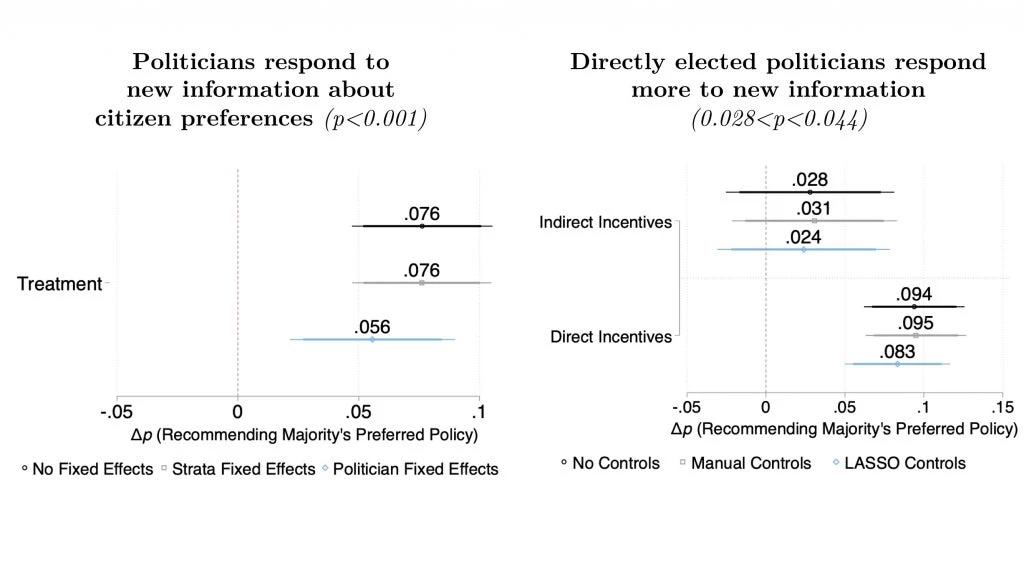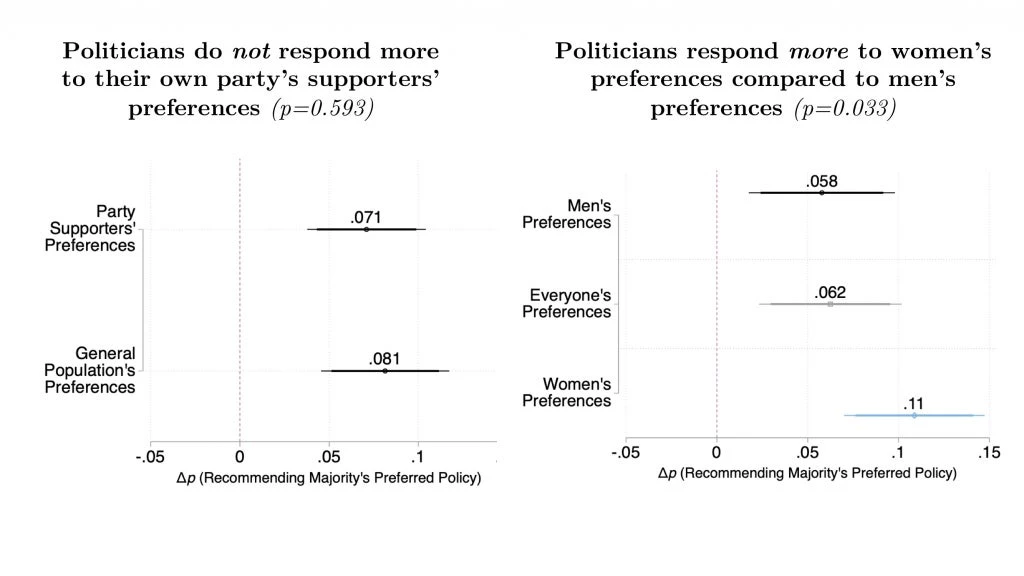This is the fourth in our series of students on the job market this year.
Information asymmetries cause market failures in many domains. Do such asymmetries exist in politics? If so, how do they affect accountability and public good provision? Studies on the role of information in accountability usually ask whether voters know enough about politicians’ actions to sanction them (Pande, 2011; Dunning et al., 2019).
In my job market paper, I ask instead whether politicians know enough about voters to adequately represent them.
I show that there is a substantial gap in what politicians in Pakistan know about citizen preferences. I also provide experimental evidence that their actions respond to new information, indicating that this gap prevents politicians from delivering what citizens want. Strikingly for a context where women are largely excluded from political spaces, they respond more to new information on what women want compared to information on what men want. To find out why, keep reading!
I start by establishing that politicians have highly inaccurate beliefs about what citizens prefer. I measure citizen preferences—and politicians’ beliefs about these preferences—on nine important binary trade-offs. I chose the issues using responses from citizens and politicians to previous survey questions on the issues that matter to them. One example is the trade-off between spending marginal local government resources on street lighting versus water filtration plants.
Politicians are only marginally more accurate than a random guesser. My sample includes 653 local politicians in Lahore, Pakistan. They correctly guess which one of two policies is preferred by the majority 59 percent of the time. I also calculate the distance between the proportion of citizens that prefer a policy and what politicians think this proportion is, and benchmark this distance against how well a random guesser would do. On this measure of accuracy, politicians score 15 on average, which is far closer to the random guess benchmark (0) than to perfect accuracy (100).
Showing this information gap is not sufficient to establish that what politicians know has consequences for accountability and public good provision. An information gap could simply reflect that politicians do not care what citizens prefer. I next ask whether experimentally alleviating the information gap affects how politicians act.
I conduct this field experiment in partnership with a large political party in Pakistan. Two-thirds of the 653 local politicians in my sample are randomized into receiving information on citizen preferences. Treatment politicians are further randomized into receiving the preferences of one out of six sub-populations defined along two dimensions: gender (men only, women only or both) and partisanship (supporters of their own party or voting age citizens in general). Each treatment politician receives information on six out of nine issues while control politicians do not receive any information.
I measure responsiveness by observing what local politicians recommend to their higher tier party leadership, which is the primary way in which they influence outcomes for citizens. Under the status quo, recommendations are made on a frequent but informal basis. Working with the party, I develop a formal “policy recommendation mechanism”. The party sends its local politicians an official letter soliciting their recommendations and promises to use these recommendations in policymaking, ensuring that the stakes are real.
Information matters for politicians’ actions: I find that politicians respond to information about citizen preferences. When presented with this information, they are 7.6 percentage points more likely to recommend the policies supported by the majority of citizens. This is a 14.5 percent improvement over the control group in which only 52.5 percent of recommendations are in line with the majority's preference. ..
Next, I ask whether responsiveness varies by the type of politician who receives information and by the type of citizen whose preferences are provided to politicians.
How politicians are elected matters for responsiveness: I find that directly elected politicians are significantly more responsive than indirectly elected ones. The former category includes almost exclusively male politicians who are directly elected on a ward member or union council chair position, while the latter category includes appointed woman councilors and union council vice chairs who run on a joint ticket with the chair. This constitutes suggestive evidence that politicians' incentives affect responsiveness. Interestingly, incentives don’t seem to matter for existing information, since directly elected politicians are as uninformed as indirectly elected ones.
Information is not used to favor co-partisans: Politicians are not more responsive to the preferences of their own party's supporters versus the electorate at large. This shows that politicians do not use new information to discriminate in favor of their core supporters.
Politicians are more responsive to information about women’s preferences: Politicians are nearly twice as responsive to information on the preferences of women compared to men. When presented with data on women's preferences, politicians are 10.9 percentage points (20.8 percent) more likely to recommend the policy supported by the majority. When presented with data on men's preferences, the corresponding increase is 5.8 percentage points (11.0 percent). This implies that in a context where politics is a largely male domain, returns to increased women's participation in consultative processes may be high.
Why? Because they think they know less about women. Under my model, this occurs because they are less confident in their prior beliefs about women compared to men. When they receive a new ‘signal’ about women, they place a higher weight on this signal and hence update their beliefs more. I provide suggestive evidence for this channel using survey responses showing that politicians are thrice as likely to state that they know more about the preferences of men than women. I provide evidence that is inconsistent with other explanations: (i) beliefs about women are not less accurate, and (ii) politicians do not believe that responding to women might provide greater electoral returns or (iii) that the party expects greater responsiveness towards women.
These findings raise the question of why politicians do not exert greater effort to acquire better information about citizen preferences when they value this information and are responsive to it. I provide suggestive evidence that the reasons are gendered: they believe they do not need more information about men, and social norms prevent them from acquiring more information about women.
Implications: What affects public good provision is a central question for development economics. This paper is the first to show that what politicians know about citizens may affect how public goods are provided in developing democracies. The findings also suggest that even in a setting where women are largely excluded from political networks and hold office and vote at lower rates, policy may still shift closer to women's preferences if politicians are better informed. This paper also ties in with literatures on information frictions in various domains such as labor markets, housing markets, health, energy and agriculture by showing evidence of frictions in how politicians acquire information.
Policy recommendations:
1. Parties should institutionalize better mechanisms for the flow of information from citizens to politicians. These mechanisms should pay particular attention to including those citizens that are underrepresented in existing channels. .
2. Civil society organizations also have a role to play in promoting the dissemination of better information and creating platforms where marginalized citizens can engage with politicians. This role is especially important in cases where electoral incentives or institutional inertia discourages parties from engaging in internal reform. I explore this role in ongoing research.
Asad Liaqat is a PhD student at Harvard University




Join the Conversation